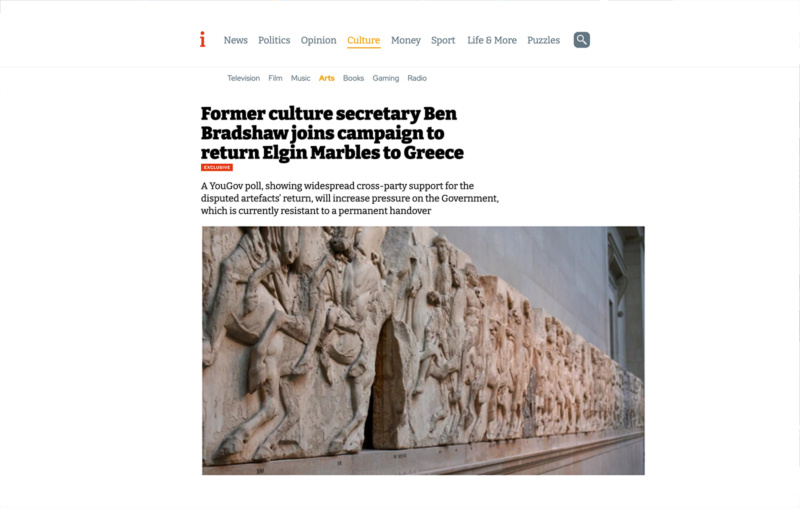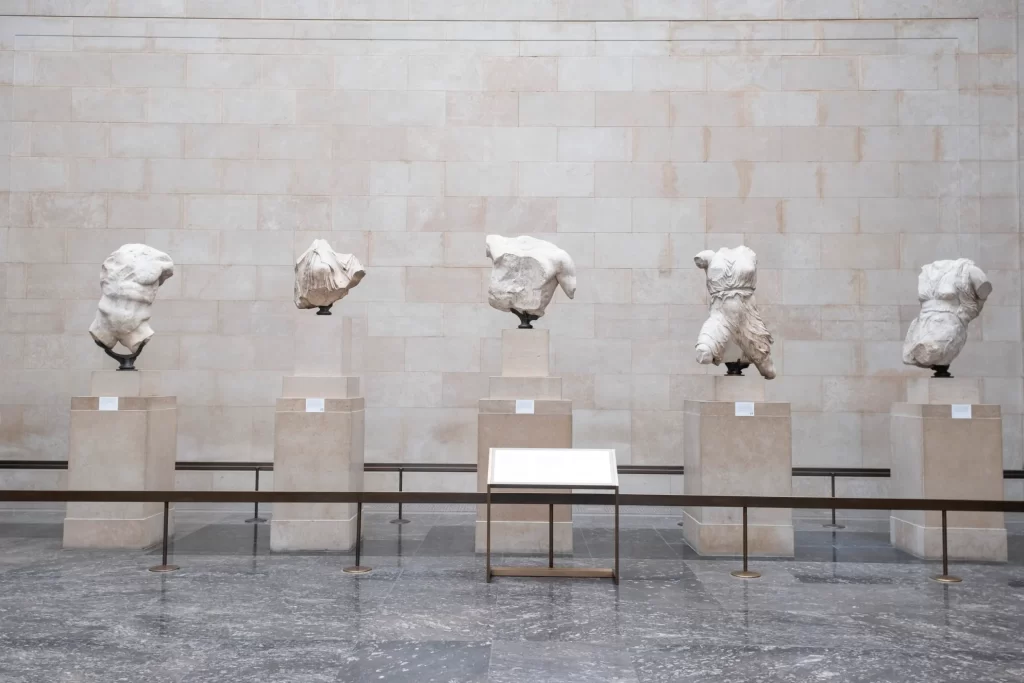Former culture secretary Ben Bradshaw joins campaign to return Elgin Marbles to Greece

A YouGov poll, showing widespread cross-party support for the disputed artefacts’ return, will increase pressure on the Government, which is currently resistant to a permanent handover
Former culture secretary Ben Bradshaw has teamed up with a Greek campaign to return the Elgin Marbles, saying their rightful home is at the Acropolis Museum in Athens.
Mr Bradshaw joins figures including Lord Vaizey and Stephen Fry who are calling for the Parthenon Sculptures, held by the British Museum, to be returned to Athens.
“It’s only right that the sculptures should be viewed as one piece of art in the Acropolis Museum [in Greece],” Bradshaw, a Labour minister who served under Tony Blair and Gordon Brown, said.
A YouGov poll, showing widespread cross-party support for the disputed artefacts’ return, will increase pressure on the Government, which is currently resistant to a permanent handover.
A majority of Britons favour their return, with 44 per cent of Conservative voters backing the move, compared to 25 per cent of Tory supporters who believe they should stay in the UK.
Of those who voted Labour in the last election, 67 per cent believe they should return.
Bradshaw said he hoped Rishi Sunak would end the Government’s opposition to restitution and support their return.
“I hope that as Rishi Sunak has family roots in a different culture he might be more sensitive to these issues and he won’t stand in the way of their return,” he told i.

“The Marbles have become a high-profile symbol of cultural injustice,” the former minister said. “Returning them would send a very good signal that Britain is still an outward-looking and engaged nation in a post-Brexit world. We’re not a small island looking in on itself.”
The 2,500 year-old sculptures were removed from Greece’s Parthenon temple in the early 19th century, when the country was under Ottoman occupation, by the Scottish soldier and diplomat, Lord Elgin.
Mr Bradshaw has joined the advisory board of the Parthenon Project, founded by Greek businessman, John Lefas, to push for the change in legislation that would pave the way for the sculptures’ return.
“It’s a long-running wrong and I’ve never understood why this problem can’t be resolved. Attitudes to restitution are changing across the world and at the British Museum,” the ex-minister said.
Mr Bradshaw added: “It is clear there is widespread support amongst the British public, and amongst all political parties, for the principle of returning the Parthenon Sculptures to their rightful home in Athens.”
He added: “The British Museum is a ‘museum of the world’, and Greek artefacts will and should continue to be displayed there as part of a new cultural partnership. A win-win solution for reunification has never felt closer.”
“As a symbol of democracy representing the cultural identity of millions of people,” it was right for the sculptures to transfer to the Acropolis Museum.
“The idea that the country of origin for contested works can’t look after them is so out of date. Athens has wonderful facilities. Most people don’t understand why this is a problem for the British Museum,” said Bradshaw.
The poll found that amongst those who voted Leave in the EU Referendum, 47 per cent said the UK should return the sculptures to Greece, while 28 per cent said they did not mind either way.
A majority of people aged above 50, including 56 per cent of 50-64 year-olds and 52 per cent of 65 and overs, were also in support of returning the sculptures.
Former Conservative chancellor, George Osborne, now chairman of the British Museum, has said that a “deal is to be done” over the marbles’ future, possibly involving an exchange of treasures and shared possession between Britain and Greece. The museum’s trustees want Government approval before agreeing to the marbles’ return.
Liz Truss ruled out a deal during her brief stint as prime minister but campaigners hope Mr Sunak, who has yet to make his position clear, could be open to persuasion.
Mr Lefas is proposing a cultural exchange which would involve a rotating exhibition of Greek artefacts which have never before travelled, being shown at the British Museum.
Lord Vaizey, former culture minister and chair of the Parthenon Project, said: “The argument for returning the Parthenon Sculptures, an extremely important symbol for the people of Greece – comparable to Stonehenge for Britons – is clearcut and logical.”
“I’m so pleased to welcome Ben Bradshaw to the advisory board and to join him in making the case to Parliamentarians from all parties and an increasingly receptive public that the time for reunification is here.”
Mr Fry has compared the taking of the marbles from occupied Greece to the Americans trying to remove the Eiffel Tower from Paris when it was under German occupation.
Technology could provide a solution. A “new” Parthenon sculpture of a horse’s head, carved by robots from the same Greek marble used on the originals, was unveiled this month by the Oxford-based Institute for Digital Archaeology. The replica was created after 3D cameras scanned the originals in the British Museum.
Any permanent return requires a change to the 1983 National Heritage Act, which restricts some national museums from deaccessioning objects from their collection.
The 1963 Museum Act also prevents British Museum trustees from disposing of items, including the equally-contested Benin Bronzes of Nigeria.
How Can You Get Involved?
If you would like to join the efforts to reunite the Parthenon Sculptures in Greece through a cultural partnership and receive emails with campaign updates from Pagefield Communications, please subscribe below.
For press enquiries, please contact Pagefield Communications at parthenonproject@pagefield.co.
